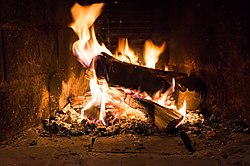Combustion
Combustion is the process of burning. Combustion is a reaction of a fuel with an oxidant to give out heat. The release of heat can produce light in the form of a flame.
Car engines and rocket engines both work by combustion. Combustion in a Ferrari car motor is different from combustion in a rocket engine. Car combustion is gas burning and exploding in cylinders called pistons again and again to push them up and down, making the car move. Rocket combustion is made by rocket fuel exploding out of the back of the rocket moving it up. The burning of most substances is bad for the environment and the ozone layer because it can let off greenhouse gases such as carbon dioxide. Hydrogen burns cleanly and gives off a lot of heat, but it does not produce much power, and is highly explosive.
The fire tetrahedron (contains oxygen fuel heat and chemical chain reaction) show the components of combustion. During combustion, fuel reacts with oxygen and heat, then releases energy. Complete combustion happens in a plentiful supply of oxygen. Complete combustion releases more energy than incomplete combustion. Incomplete combustion occurs when the supply of air is limited, or poor. Incomplete combustion also creates carbon monoxide, and even soot. Several factors must be considered when choosing the best fuel for a particular purpose. Fuels are substances that react with oxygen to release useful energy. Most of the energy is released as heat, but light energy is also released. About 21 per cent of the air is oxygen. When a fuel burns in plenty of air, it receives enough oxygen for complete combustion. Complete combustion needs a plentiful supply of air so that the elements in the fuel react fully with oxygen. Fuels such as natural gas and petrol contain hydrocarbons. These are compounds of hydrogen and carbon only. Combustion is a high-temperature oxidation reaction.
Combustion Media
Air pollution abatement equipment provides combustion control for industrial processes.
A general scheme of polymer combustion
Antoine Lavoisier conducting an experiment related to combustion generated by amplified sunlight
Related pages
Other websites
![]() Media related to Combustion at Wikimedia Commons
Media related to Combustion at Wikimedia Commons





